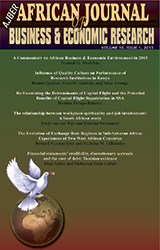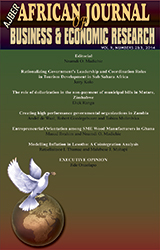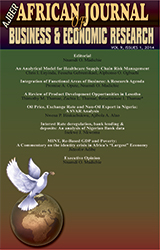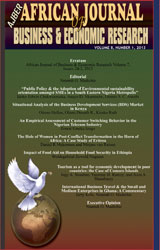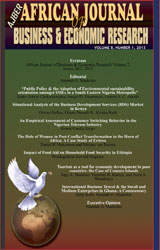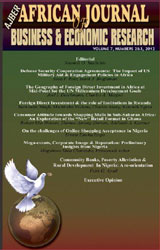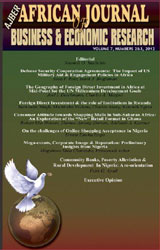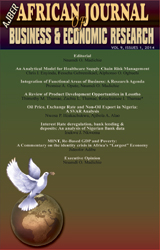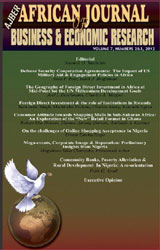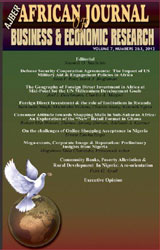
 editor@adonis-abbey.com
editor@adonis-abbey.com ![]() UK: 0207 795 8187 / Nigeria:+234 705 807 8841
UK: 0207 795 8187 / Nigeria:+234 705 807 8841

Publication Frequency: Quarterly (Four times a year) ISSN: 1750-4554 E-ISSN: 1750-4562. SCImago Journal Ranking for 2024: Quartile: Q4; SJR: 0.156
View Table of Content
African Journal of Business and Economic Research (AJBER), Volume 8, Numbers 2&3
Sub-Saharan Africa has been on world headlines in recent months, more for devastating and heart-wrenching news than for any other. The news is sour from the South to North, West to East – and especially so in the largest economies such as South Africa and Nigeria, and other rising power houses such as Kenya. In the particular case of South Africa, December 6, 2013 marks a great loss as the world witnessed the departure of a global statesman who delivered his country from the dark days of apartheid, Nelson Rolihlahla (troublemaker) Mandela, South African anti-apartheid revolutionary who was imprisoned and then became a politician, philanthropist, and President of his country between 1994 to 1999, who died at the age of 95. As the current President Jacob Zuma put it (Laing, 2013) "Our nation has lost its greatest son." The implications of Mandela's death are far-reaching for a country that has been bedevilled with political uncertainty wit...
View Table of Content
African Journal Of Business and Economic Research Volume 8, Number 1, 2013
African Business in a global context. These range from the public policy actions towards environmental sustainability; business development services and/ or support for micro-enterprises; the debate over food aid vis-a-vis food security; the place and role of women in the economic development of the continent; the role of SMEs in international business travel; and the growing importance of Tourism as a tool for economic development in both poor and scant reported contexts such as the Comoro Islands, as well as well researched middle income countries such as Ghana. Overall a record number of countries are covered in this issue, Ghana, Nigeria, Ethiopia and Eritrea and Comoros Islands. We expect this trend to continue as papers that report trends and developments in other little reported countries such as Cape Verde, Equatorial Guinea, Lesotho, Madagascar and Mozambique, amongst others would be welcome addition for consideration in our next issue....
View Table of Content
African Journal of Business and Economic Research. vol. 7 No. 2-3
A lot has happened, both good and bad, in Africa in the last 12 months alone. On the sad note, four presidents/ heads of government have died whilst still holding office, Chinese investments in the continent have unravelled their dark side, Islamists have reared their ugly heads in both Mali and Nigeria, and protesters have been mowed down by police in South Africa. On a positive note however, the World Bank’s Doing Business report has identified one of the best reformers to be from the continent – i.e. Rwanda. What’s more? Ethiopia only recently made history by taking delivery of the coveted Boeing 787 “Dream liner” aircraft, well ahead of India and other global players – albeit only a few days before the country lost its leader. On the death of presidents in office, it is worth mentioning that since 2008, this has happened only 13 times worldwide, but Africa holds a record of 10 out of these. The latest is the death, af...
View Table of Content
African Journal of Business and Economic Research Vol 7 No1 2012 (Gues editors:Nnamdi O. Madichie, Daphne HalkiasJohn O. Okpara),
I am honoured to be given the opportunity to write the guest editorial for this first issue of 2012 which corresponds with my assumption of office as the Editor-in-Chief for the African Journal of Business & Economic Research. I must say that filling these shoes is a gargantuan task as my predecessor has set a stage that would be rather difficult to ascend. I can only hope that considering that the editorial board, most of whom have been retained, AJBER can only move in two directions – upwards and forward. I would like to acknowledge the hard work of three people in bringing about a successful completion of this first issue of 2012. First, my gratitude goes out to Daphne Halkias, for playing a central role inidentifying papers from the Global Islamic Marketing conference with some fit with what our readership would like to see more of in AJBER. Daphne worked tirelessly in the initial vetting of papers, as well as in the prior reviews of the selected papers from the Globa...
To subscribe to any of the journals, Please Email Us.




